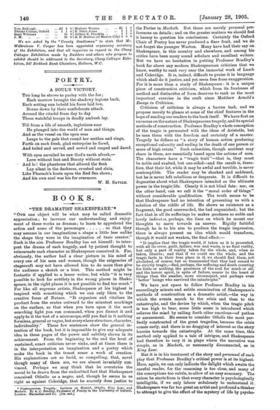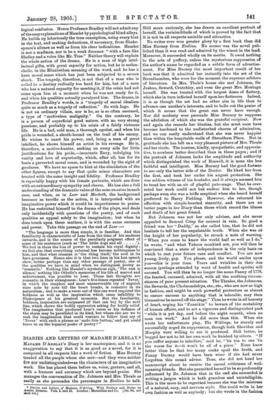"THE DRAMATIST SHAKESPEARE."*
action and some of the personages so that they may assume in our imaginations a shape a little less un'ike the shape they wore in the imagination of their creator." Such is'the aim Professor Bradley has set himself: to inter- pret the drama of each tragedy, and by patient thought to reincarnate each character as Shakespeare conceived it. For, obviously, the author bad a clear picture in his mind of every one of his men and women, though the exigencies of stagecraft may not have allowed him to do more than give the audience a sketch or a hint. This method might be fantastic if applied to a lesser writer, but while "it is very possible to look for subtlety in the wrong places in Shake- speare, in the right places it is not possible to find too much." For like all supreme artists, Shakespeare at his highest is inspired with something which we can only liken to the creative force of Nature. " It organises and vitalises its product from the centre outward to the minutest markings on the surface, so that when you turn upon it the most searching light you can command, when you dissect it and apply to it the test of a microscope, still you find in it nothing formless, general or vague, but everywhere structure, character, individuality." These few sentences show the general in- tention of the book, but it is impossible to give any adequate idea in these pages of the power and subtlety shown in its achievement. From the beginning to the end the level of sustained, exact criticism never Rinks, and at times there is in the interpretation an imagination and a poetry which make the book in the truest sense a work of creation. His explanations are so lucid, so compelling, that, novel though many of them are, we are almost invariably con- vinced. Perhaps we may think that he overstates the moral to be drawn from the undoubted fact that Shakespeare conceived Othello as a negro. and, though he seems to us right as against Coleridge, that he scarcely does justice to • Shakespearean Tragedy: Lectures on Hamlet, Othello, King Lear, and Macbeth. By A. C. Bradle,y, Professor of Poetry in the lJnivereity of Oxford. London : Macmillan and Co. [10a. net.]
ferences on details ; and on the greater matters we should feel it heresy to question his conclusions. Certainly the Oxford Chair of Poetry has never produced a finer fruit, and we do not forget the younger Walton. Many have had their say on.
Shakespeare, in this country and elsewhere, and among his critics have been many sound scholars and excellent writers. But we have no hesitation in putting Professor Bradley's book far above any modern Shakespearean criticism that we know, worthy to rank very near the immortal work of Lamb and Coleridge. It is, indeed, difficult to praise it in language which shall do it justice, and yet seem free from exaggeration.
For it is more than a study of Shakespeare : it is a unique piece of constructive criticism, which from its freshness of method and distinctive of form deserves to rank as the most important exercise in the craft since Matthew Arnold's Essays in Criticism.
Criticism of criticism is always a barren task, and we propose merely to glance at some of the chief features in the hope of sending our readers to the book itself. We have first an excursus on the nature of Shakespearean tragedy, and its special methods of construction. Professor Bradley's whole conception of the tragic is permeated with the ideas of Aristotle, but he uses them with the freedom and certainty of a master. Tragedy he defines as " a story of human action producing exceptional calamity and ending in the death of one person or more of high estate." Such calamities, though accident may share in them, are essentially based upon the actions of men. The characters have a " tragic trait "—that is, they must be noble and exalted, but one-sided—and the result is, there- fore, that their lot, while it may be awful and terrible, is never contemptible. The reader may be shocked and saddened, but he is never left rebellious or desperate. It is difficult to dogmatise about what Shakespeare intended as the ultimate
power in the tragielife. Clearly it is not blind fate : nor, on the other hand, can we call it the " moral order of things" without considerable qualification. The truth seems to be that Shakespeare 'had no intention of presenting us with a solution of the riddle of life. He shows us existence as a fragment, the good unrewarded, the bad unpunished; but the.
fact that in all its sufferings he makes goodness so noble and lovely indicates, perhaps, the lines on which he meant our thoughts to move towards an answer. Rigidly faithful though he is to his aim to produce the tragic impression, there is always present an idea which would transform, though it would not weaken, the final effect :—
" It implies that the tragic world, if taken as it is presented, with all its error, guilt, failure, woe and waste, is no final reality, but only a part of reality taken for the whole, and, when so taken, illusive; and that if we could see the whole, and the tragic facts in their true place in it, we should find them, not abolished, of course, but so transmuted that they had ceased to be strictly tragic,—find, perhaps, the suffering and death counting for little or nothing, the greatness of the soul for much or all,' and the heroic spirit, in spite of failure, nearer to the heart of things than the smaller, more circumspect, and perhaps even ' better' beings who survived the catastrophe."
We have ,not space to follow Professor Bradley in his exceedingly minute and subtle examination of Shakespeare's methods of construction as a dramatic artist,—the way in which the events march to the crisis and then to the catastrophe, and the device by which, when the tragic pitch is too high to bear, some little scene is introduced which relieves the mind by calling forth other emotions—of pathos or amusement. He seems to consider Othello the most per- fectly constructed of the great tragedies, because the crisis comes early, and there is no dragging of interest as the story hurries towards the catastrophe. At the same time, this method only applied to a tale of intrigue, and Shakespeare had therefore to vary it in plays where the narrative was simple, as in Macbeth, or necessarily disconnected, as in King Lear.
But it is in his treatment of the story and personnel of each play that Professor Bradley's critical power is at its highest. Here, again, we can only indicate the delight which awaits the
careful reader, for the reasoning is too close, and many of the conceptions too subtle, to allow of an easy summary. The
axiom he starts from is that every character is psychologically intelligible, if we only labour sedulously to understand it., Shakespeare was far too great an artist and profound a thinker to attempt to give the effect of the mystery of life by psycho-
of the easy explanations of Hamlet by psychological blind-alleys. He builds up laboriously the true conception, using every hint in the text, and making deductions, if necessary, from Shake- speare's silence as well as from his clear indications. Hamlet is not a madman, nor is he a weak dreamer " with a face like Shelley and a voice like Mr. Tree." Neither theory will explain the whole action of the drama. He is a man of high intel- lectual gifts, with great capacity for action, but be is melan- cholic, in the Elizabethan meaning of the word, and he has a keen moral sense which has just been subjected to a severe shock. The tragedy, therefore, is not that of a man who is called to a destiny radically too hard for him, but of a man who has a natural capacity for meeting it, if the crisis had not come upon him at a moment when he was not ready for it, and when his qualities actually paralysed him. The drama, in Professor Bradley's words, is a "tragedy of moral idealism quite as much as a tragedy of reflection." So with Iago. He is not an ordinary villain, nor is he, as is so often assumed, a type of " motiveless malignity." On the contrary, he is a person of superficial good nature, with no very strong passions, and probably up to his crisis of a fairly virtuous life. He is a bad, cold man, a thorough egotist, and when his pride is wounded, a sleuth-hound on the trail of his enemy. He wishes to exert his power, and, being a man of great intellect, he shows himself an artist in his revenge. He is, therefore, a motive-hunter, seeking on every side for little justifications for his pride,—incarnate Envy, indulging his vanity and love of superiority, which, after all, has for its basis a perverted moral sense, and is wounded by the sight of goodness. We have no space to hint at the elucidation of the other figures, except to say that quite minor characters are treated with the same insight and fidelity. Professor Bradley is especially happy with his female portraits, which are done with an extraordinary sympathy and charm. He has also a full understanding of the dramatic value of the mise-en-scene in each case, and when, as in Lear and Macbeth, the background becomes as terrific as the action, it is interpreted with an imaginative power which it would be impertinence to praise.
He has restricted himself to the drama of the plays, and deals only incidentally with questions of the poetry, and of such qualities as appeal solely to the imagination ; but when he does touch upon these matters, it is with the same sureness and power. Take this passage on the end of Lear :—
" The language is more than simple, it is familiar. And this familiarity is characteristic of Lear from the time of his madness onwards, and is the source of the peculiarly poignant effect of some of his sentences (such as The little dogs and all ,). We feel in them the loss of power to sustain his royal dignity ; we feel also that everything external has become nothingness to him, and that what remains is the thing itself,' the soul in its bare greatness. Hence also it is that two lines in his last speech show, better perhaps than any other passage of poetry, one of the qualities we have in mind when we distinguish poetry as romantic.' Nothing like Hamlet's mysterious sigh, The rest is silence,' nothing like Othello's memories of his life of marvel and achievement, was possible to Lear. Those last thoughts are romantic in their strangeness : Lear's five-times repeated Never,' in which the simplest and most unanswerable cry of anguish rises note by note till the heart breaks, is romantic in its naturalism ; and to make a verse out of this one word required the boldness as well as the inspiration which came infallibly to Shakespeare at his greatest moments. But the familiarity, boldness, inspiration are surpassed (if that can be) by the next line, which shows the bodily oppression asking for bodily relief. The imagination that produced Lear's curse or his defiance of the storm may be paralleled in its kind, but where else are we to seek the imagination that could venture to follow that cry of 'Never' with such a phrase as undo this button,' and yet could leave us on the topmost peaks of poetry ? "























































 Previous page
Previous page